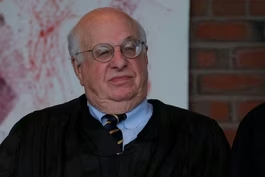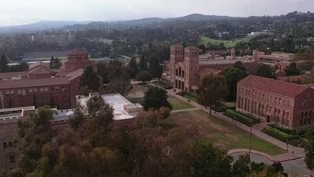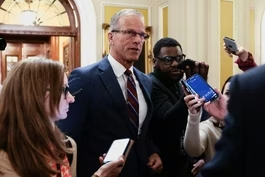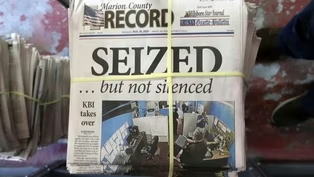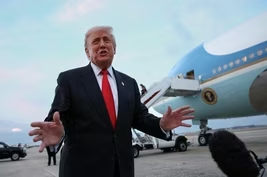
BBC under scrutiny over edit of Trump's speech on Jan. 6
Clip: 11/11/2025 | 7m 13sVideo has Closed Captions
BBC under scrutiny over edit of Trump's speech on Jan. 6
President Trump is threatening to sue the BBC for $1 billion, claiming a documentary misrepresented his role in the Jan. 6 attack. Trump’s legal team says the BBC edited video to look like he urged supporters to “fight like hell” immediately after directing them to march on the Capitol. The two lines came more than 50 minutes apart. Geoff Bennett discussed more with Brian Stelter of CNN.
Problems playing video? | Closed Captioning Feedback
Problems playing video? | Closed Captioning Feedback
Major corporate funding for the PBS News Hour is provided by BDO, BNSF, Consumer Cellular, American Cruise Lines, and Raymond James. Funding for the PBS NewsHour Weekend is provided by...

BBC under scrutiny over edit of Trump's speech on Jan. 6
Clip: 11/11/2025 | 7m 13sVideo has Closed Captions
President Trump is threatening to sue the BBC for $1 billion, claiming a documentary misrepresented his role in the Jan. 6 attack. Trump’s legal team says the BBC edited video to look like he urged supporters to “fight like hell” immediately after directing them to march on the Capitol. The two lines came more than 50 minutes apart. Geoff Bennett discussed more with Brian Stelter of CNN.
Problems playing video? | Closed Captioning Feedback
How to Watch PBS News Hour
PBS News Hour is available to stream on pbs.org and the free PBS App, available on iPhone, Apple TV, Android TV, Android smartphones, Amazon Fire TV, Amazon Fire Tablet, Roku, Samsung Smart TV, and Vizio.
Providing Support for PBS.org
Learn Moreabout PBS online sponsorshipGEOFF BENNETT: President Trump is threatening to sue the BBC for $1 billion, claiming the broadcaster misrepresented his role in the January 6 Capitol attack.
According to Mr.
Trump's legal team, a BBC documentary that aired ahead of the 2024 presidential election cut together remarks made by Mr.
Trump to make it appear as if he urged his supporters to, in his words, fight like hell immediately after directing them to march to the U.S.
Capitol.
In reality, the two lines came more than 50 minutes apart.
The fallout has been swift.
Following the controversy and mounting backlash over perceived bias at the BBC, two of the broadcaster's most senior executives resigned.
That's director-general Tim Davie and BBC news chief executive Deborah Turness.
Turness defended the BBC's reputation while speaking to reporters this week.
DEBORAH TURNESS, Former CEO, BBC News: I stepped down over the weekend because the buck stops with me.
But I'd like to make one thing very clear.
BBC News is not institutionally biased.
That's why it's the world's most trusted news provider.
GEOFF BENNETT: And we're joined now by Brian Stelter, chief media analyst for CNN.
Brian, it's always good to see you.
Thanks for being with us.
BRIAN STELTER, CNN Chief Media Correspondent: Thanks.
GEOFF BENNETT: So this documentary program in question, "Panorama," it's the crown jewel of the BBC's reporting operation.
Help us understand more about this editorial breach, the edit itself and why President Trump and his supporters are saying it misled viewers.
BRIAN STELTER: That's right.
This is an important program on the BBC schedule.
And this documentary aired right before the U.S.
presidential election.
It was a documentary about Trump's reelection campaign called "Trump: A Second Chance."
It interviewed Trump voters.
It really featured the voices of voters in America.
I actually think, if the Trump White House watched the documentary, they would find a lot to like in the documentary.
But there was this moment where the January 6 video was shown, Trump's speech at the Ellipse was shown, and it was edited in a way that was clearly a big screw-up.
I would call this a big screw-up, a big journalistic screw up, but in a very small, narrow way, because it was one small part of a long documentary, and, most importantly, because nobody seemed to notice it at the time.
There was no outcry last year.
There was no outrage.
This only became a story about a week ago when a leaked memo, it was obtained by the Telegraph newspaper, exposing what went wrong in this documentary.
Now Trump is calling for a retraction of the entire documentary, but, like I said, it's a really thoughtful, nuanced film with just one big mistake involving January 6.
GEOFF BENNETT: And stepping back, we know the established timeline.
We know all of the testimony about what Donald Trump did not do on January 6, his inaction as the violence unfolded, his delay in calling in the National Guard.
How does the factual record bear on his claim that the BBC edit distorted the meaning of his words?
BRIAN STELTER: Yes, and Trump's behavior that day, his combative tone in the speech, his repeated references to fight, all of that contributed to the producers' decision to stitch these words together.
There's no indication that it was malicious, meaning it wasn't intended to interfere with the U.S.
election.
But it was something that happened during the production process, possibly by an outside production company.
We don't exactly know how it was reviewed by the BBC ahead of time or who ultimately is responsible.
But, as you mentioned, those two top executives have now both resigned as a result of the uproar.
And, more broadly, for President Trump, this is a chance to challenge a big media company.
And it's a chance for him to proclaim his innocence about January 6.
I think that's why this story is resonated with many Trump voters and certainly with Trump aides.
They're trying to argue that Trump did nothing wrong that day and it's actually the media's fault.
GEOFF BENNETT: How seriously is the BBC taking this $1 billion lawsuit threat?
BRIAN STELTER: My sense is, it's a very serious threat inside the BBC.
There's a lot of concern.
Staffers are worried about what the board is going to do.
And we haven't heard much about the plan within the Board of Governors.
There are 13 board members who oversee the BBC.
Normally, one of those members is the director general, the man who just resigned, who just stepped down.
And now the Trump lawyers have given this Friday deadline.
There's not actually a literal deadline.
I mean, the BBC doesn't have to respond for any legal reason.
But it does seem likely that Trump might move ahead with a lawsuit if he doesn't get what he wants from the BBC.
And so now the BBC is in the same position that Paramount was in, that Disney was in, that The New York Times and The Wall Street Journal are in right now.
Trump is suing both those publications.
Every media company, when challenged by Trump, has to ask, do we fight or do we fold?
Do we fight in court or do we give in to his demands?
And that's what the BBC board has to decide now.
GEOFF BENNETT: And conservative critics in the U.K.
are alleging a systemic left-wing bias at the BBC.
What does all of this mean for the BBC's international reporting and its reputation?
BRIAN STELTER: Right.
Three things are going on simultaneously.
You have this actual journalistic scandal about a bad edit, a big mistake, but in a small part of a big documentary.
Then you also have this concerted political campaign, mostly from conservatives in the U.K., to undermine the BBC, to challenge its dominance in Britain.
You also have some of the BBC's big media rivals who are feasting right now on the BBC, and sometimes maybe trying to even gain or steal some market share.
And then the third thing going on, of course, is the BBC's business model, under tremendous pressure right now.
The license fees that it receives from British taxpayers might be challenged in the coming years.
You know, that's what makes the BBC unique in Britain.
It's the license fee structure.
It's the idea that everybody pays into the system.
And that is under a real threat right now because of this political campaign.
But, look, when a newsroom at the BBC makes a self-inflicted wound, a screw-up like this, it does draw all the wrong kind of attention to the organization more broadly.
And that's what we're seeing right now from Trump and everywhere else.
GEOFF BENNETT: Can I ask you, based on your reporting, how realistic is a successful defamation claim here against a U.K.
public broadcaster?
BRIAN STELTER: Not very realistic at all.
Whether this was filed in the U.K.
or whether it's filed in Florida or some other U.S.
state, Trump likely has a very weak case here.
And the BBC would have a very strong argument in court.
But that's, I think, not really the question.
The question is whether the BBC is willing to risk it, whether it's willing to go to court or not.
We have seen some media companies try to settle with Trump, try to make him go away, either by paying money toward his future presidential library or by changing editorial coverage.
And that's the big concern I'm hearing from BBC staffers now.
Will the corporation stand up to Trump, try to mount a defense, reject his demands for a retraction and for an apology?
Or will the BBC try to reach some sort of deal, try to appease him in some way?
I know, Geoff, we have covered several of these cases this year, and what we have learned, I think, is that when media companies do appease, when they appear to capitulate, there is severe consumer backlash.
Just ask Disney with Jimmy Kimmel.
On the other hand, the BBC has to think about many factors here, including board members who might be more conservative in thinking, and of course, the future of the license fee system.
GEOFF BENNETT: Brian Stelter, chief media analyst for CNN, always good to see you.
BRIAN STELTER: Thanks.
Book explores Edmund Fitzgerald wreck and legend it inspired
Video has Closed Captions
Clip: 11/11/2025 | 8m 42s | 'The Gales of November' explores the Edmund Fitzgerald tragedy and the legend it inspired (8m 42s)
Conservative judge resigns, calling Trump uniquely dangerous
Video has Closed Captions
Clip: 11/11/2025 | 8m 31s | Prominent conservative judge resigns, calling Trump 'uniquely dangerous' (8m 31s)
How UCLA is navigating Trump's unprecedented demands
Video has Closed Captions
Clip: 11/11/2025 | 8m 55s | How UCLA is navigating unprecedented demands from the Trump administration (8m 55s)
Inside the deal to end the government shutdown
Video has Closed Captions
Clip: 11/11/2025 | 4m 31s | Breaking down the deal to reopen the government and what comes next (4m 31s)
News Wrap: Kansas county to pay $3M for raid on newspaper
Video has Closed Captions
Clip: 11/11/2025 | 5m 31s | News Wrap: Kansas county to pay $3 million for police raid on newspaper (5m 31s)
Trump floats tariff 'dividends,' but experts doubt the math
Video has Closed Captions
Clip: 11/11/2025 | 7m 10s | Trump floats tariff 'dividends' for Americans, but experts question the math (7m 10s)
Providing Support for PBS.org
Learn Moreabout PBS online sponsorship
- News and Public Affairs

FRONTLINE is investigative journalism that questions, explains and changes our world.

- News and Public Affairs

Amanpour and Company features conversations with leaders and decision makers.

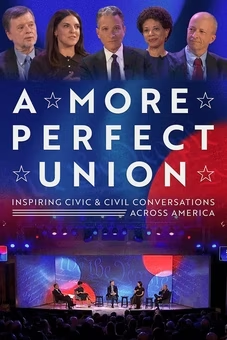

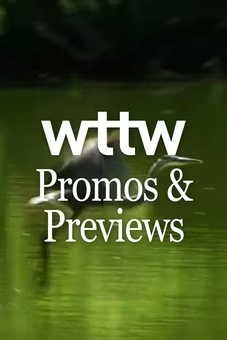








Support for PBS provided by:
Major corporate funding for the PBS News Hour is provided by BDO, BNSF, Consumer Cellular, American Cruise Lines, and Raymond James. Funding for the PBS NewsHour Weekend is provided by...

